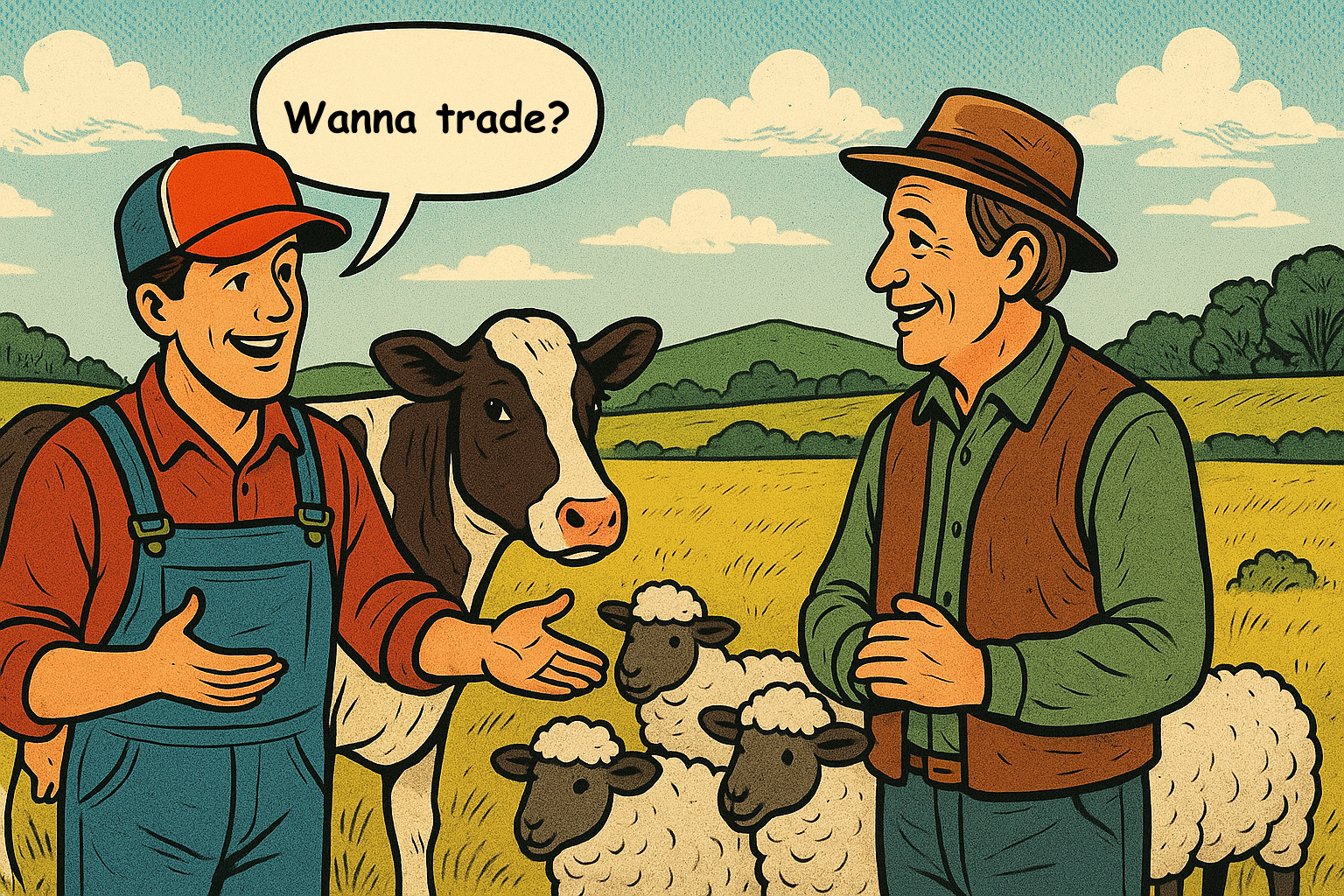Have you ever wondered why we use money instead of just trading or bartering? Have your kids ever asked you?
Chances are, you’ve probably not thought much about it, and that’s ok! But there are some pretty good reasons why we use money. Here are some reasons in case you’re curious or your little homeschooler asks you one day!
What is bartering?
Bartering is simply trading goods or services that you have directly for other goods or services you want.
Pretty simple. Most economists think early societies started out this way. Bartering is even enjoying some renewed popularity these days with trading groups on Facebook and other places.
How does it work?
Let’s say you have a cow and want some sheep. You find someone who has sheep and wants a cow. Maybe you agree that a cow is worth four sheep and so you trade. Both parties get what they want.
If you’ve ever played Settlers of Catan then you know all about trading commodities! Best game of all time!

On the surface, it seems like a straightforward way to offer what you have for something you want but there are some problems with bartering.
Problems with Bartering
Problem 1: You might not find a trading partner
Let’s take the same cow/sheep scenario. You have a cow and want sheep, but you can’t find anyone who has sheep but wants a cow. You can’t find a trading partner!
So, you could wait or keep looking. You could try another town, but that’s annoying to transport your cow. Or you could find out what the shepherd wants, for example cloth, and try to trade your cow for cloth that you can trade for sheep.
You can see that if you can’t find a direct trading partner then things quickly get more complicated.
Problem 2: Some goods are indivisible
Let’s say you have a cow to trade for some sheep and have found a shepherd who wants a cow, yay! You both agree that a cow is worth four sheep.
Oh no, the shepherd only has three sheep! What can you do? It’s not like you can cut off part of the cow to keep. You are stuck working out how to affect the trade.
Or what if you have a cow but need multiple things: sheep, eggs, cloth, and a new plow. How will you get all these items when you have only one cow to trade?
Problem 3: Difficult to store for the future
Let’s say you have a cow but don’t need anything right now. But you’re having a big Christmas party in a few months and want to trade your cow at Christmas for other things.
Will your cow still be around in a few months to trade? A cow would normally make it that long, but what if it gets sick, dies, or stolen? What if nobody wants a cow when it comes time to trade?
Or take another example, what if you have milk to trade, you can’t store that for very long before it loses its value by spoiling.
So bartering is not particularly good at storing value for the future.
Problem 4: Logistical problems
I mentioned this earlier but what if you need to transport your item over a long distance to trade it? No problem if you’re trading buttons or yarn but what if you’re trading cattle, machinery, or other heavy bulky items. What a nuisance!
God actually gave Israel a provision that addresses this very problem. Check out Deuteronomy 14:24-26! John 2:14 also relates to this scenario.
Problem 5: Difficult to Compare Values
When each trade is independently agreed to, it is hard to know what a “standard” value of any item is. Is a cow worth 4 sheep or is it 3 or 5? How much cloth could a cow get? You don’t really know what you can get for your cow until you go and try to trade, and each item might be different!
The Solution
So, there are a bunch of problems with bartering that make it complex and cumbersome for the individual and impossible to build any kind of developed economy on. A solution is needed.
That solution is a commonly accepted third commodity that can be used as a means of exchange. That commodity is money!
It might be gold or silver coins, or beads, shells, iron, or paper bills. Money solves the problems that come with bartering.
- You don’t need to find a trading partner for your cow. Just sell it and use the money to buy what you need.
- You don’t need to worry about the fact that you have one cow but need multiple items, just sell it for money and use the money to buy what you need.
- Money is store of future value. You can sell your cow today and use the money at any time down the road.
- Money is much easier to transport over distances than other items. Even God thought so apparently!
- Money allows you to compare values of items. You know how much money your cow will fetch and know how much you will need to spend to buy the items you need. You can even compare different sellers to find the best price and compare the relative values or different items.
These benefits, it turns out, are necessary for a community or national economy to grow and flourish.
Let’s be thankful we have an easy medium of exchange like money to help provide for our families and help our economy grow!
Talk about it!
Next time your family is playing Settlers of Catan, ask your kids why we don’t just trade for things. See what they say and help them understand the benefits of using money instead of barter!





